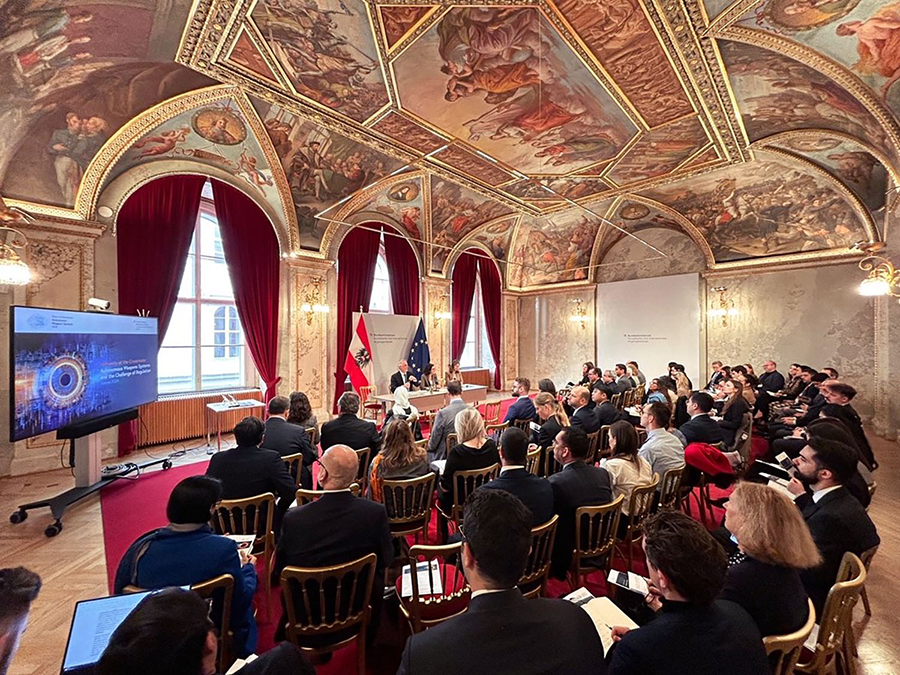“For 50 years, the Arms Control Association has educated citizens around the world to help create broad support for U.S.-led arms control and nonproliferation achievements.”
Diplomatic Debate Over Autonomous Weapons Heats Up
April 2024
By Michael T. Klare
Diplomatic activity concerning the regulation of autonomous weapons systems is accelerating. The United States convened a conference on the subject in March, Austria has scheduled one for April, and the UN General Assembly plans a debate on the topic at its fall meeting.
 The quickening diplomacy reflects growing worldwide concern over the faulty or unsupervised use of artificial intelligence (AI) and autonomous weapons in combat, possibly resulting in unintended atrocities or conflict escalation, and differing opinions over how best to prevent such perils.
The quickening diplomacy reflects growing worldwide concern over the faulty or unsupervised use of artificial intelligence (AI) and autonomous weapons in combat, possibly resulting in unintended atrocities or conflict escalation, and differing opinions over how best to prevent such perils.
The intensifying concern over the deployment of autonomous weapons is perhaps best exemplified by the lopsided Dec. 22 vote on UN General Assembly Resolution 78/241, calling for a rigorous study of the topic. Some 152 states voted in favor of the resolution, with only Belarus, India, Mali, and Russia voting no. Another 12 states abstained.
Acknowledging unease over “the possible negative consequences and impact of autonomous weapon systems on global security and regional and international stability,” the resolution calls for a comprehensive review of the subject at the next UN General Assembly, scheduled to begin Sept. 10. To ensure that such an assessment is conducted in a thoroughly informed manner, the resolution directs the secretary-general to prepare a comprehensive report on the issue, incorporating the views of all key stakeholders.
Although there is widespread agreement about the potential risks posed by autonomous weapons systems, especially when they are deployed without adequate human oversight, there is considerable international debate over the best way to regulate them. Some nations, led by the United States, advocate the adoption of voluntary constraints. Another group, led by Austria, favors a legally binding prohibition on the deployment of fully autonomous weapons systems. To promote their contending perspectives, these key actors decided to organize separate international meetings.
The first of these dueling assemblies was convened by the U.S. State Department on March 19-20 at the University of Maryland. Without much fanfare, the plenary brought together some 150 participants from nearly all of the 52 countries that have signed the “Political Declaration on Responsible Military Use of Artificial Intelligence and Autonomy.” The declaration is a set of voluntary constraints on the use of autonomous weapons systems first released by the State Department in February 2023 and then rereleased, with slightly altered language, last November. (See ACT, April 2023.)
The declaration affirms that autonomous weapons systems can play positive as well as negative roles in warfare. It also asserts that states must adopt strict guidelines on their use in order to prevent negative outcomes. For example, the declaration posits that states “should take appropriate steps, such as legal reviews, to ensure that their military AI capabilities will be used consistent with their respective obligations under international law.” But this measure and others enunciated in the declaration are purely voluntary steps, entailing no legal obligation by signatory states to abide by them and carrying no penalties if they fail to do so.
Nevertheless, organizers of the U.S. event insisted that by convening representatives of signatory states and sharing experiences, they are helping to bolster international norms against the misuse of autonomous weapons systems. “We look forward to continuing to share lessons learned and best practices to build our collective capacities to implement these responsible measures,” Assistant Secretary of State Mallory Stewart told Arms Control Today. She said that participating states agreed to form working groups to discuss implementation of specific measures in the political declaration and that the entire group will meet again in annual plenaries such as the one held in Maryland.
By contrast, the assembly being organized by Austria, officially called the Vienna Conference on Autonomous Weapons Systems and the Challenge of Regulation, will consider legally binding measures along with voluntary ones.
To be held April 29-30, it will include representation from governmental and nongovernmental entities. Its aim, according to the official announcement, is “to increase international awareness of the topic of [autonomous weapons systems] and their legal, moral, ethical, and security policy challenges,” as well as to “build momentum…for the creation of an international legal and normative framework.”
Alexander Kmentt, director of disarmament, arms control, and nonproliferation at the Austrian Foreign Ministry, said the Vienna meeting is aimed particularly at stimulating international interest in UN General Assembly deliberations on autonomous weapons systems.
In addition to awareness-raising and momentum-building for the future regulation of autonomous weapons systems, the conference is linked to the report that UN Secretary-General António Guterres has been mandated to produce, Kmentt told Arms Control Today. The conference agenda is designed to achieve this outcome by soliciting “relevant substantive input by experts” and “by stimulating states to submit their views to the [secretary-general] as input for this report,” he added.
The groups assembled by the United States and Austria have many similar concerns about the battlefield deployment of autonomous weapons systems, but also have differences about the best approach to regulating these systems. These are sure to become more pronounced as states prepare for the General Assembly’s review.
